Unit 5 Humans and Nature Lesson 3 Race to the Pole课件-(共35张PPT)高中英语北师大版(2019)必修第二册
文档属性
| 名称 | Unit 5 Humans and Nature Lesson 3 Race to the Pole课件-(共35张PPT)高中英语北师大版(2019)必修第二册 | 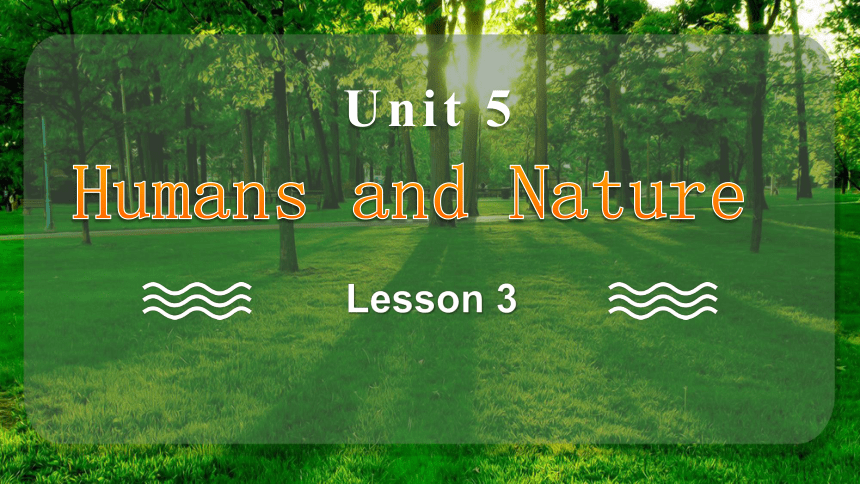 | |
| 格式 | pptx | ||
| 文件大小 | 104.5MB | ||
| 资源类型 | 教案 | ||
| 版本资源 | 北师大版(2019) | ||
| 科目 | 英语 | ||
| 更新时间 | 2025-08-01 11:02:20 | ||
图片预览

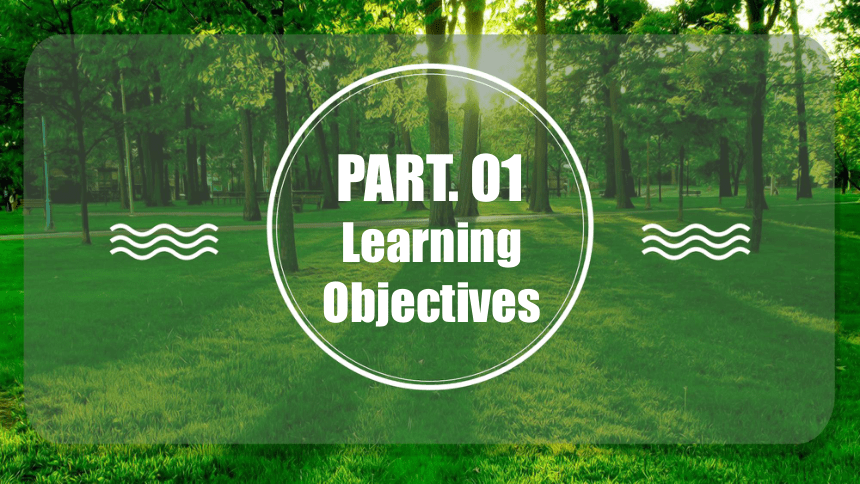
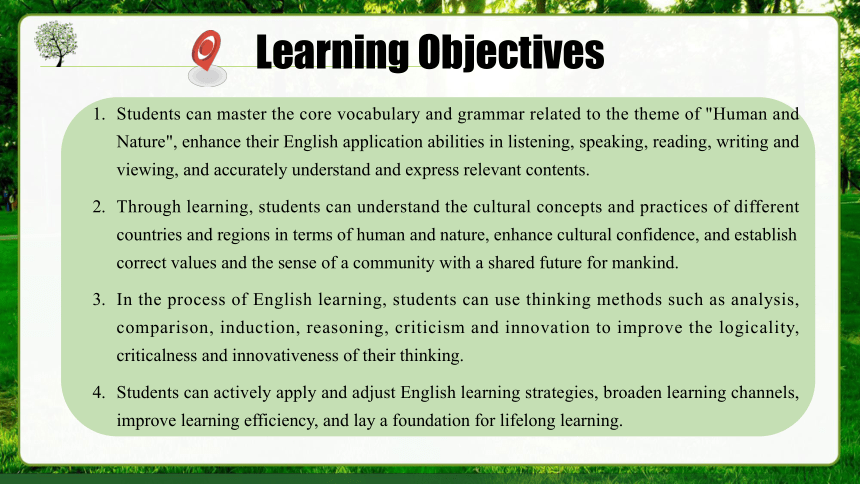
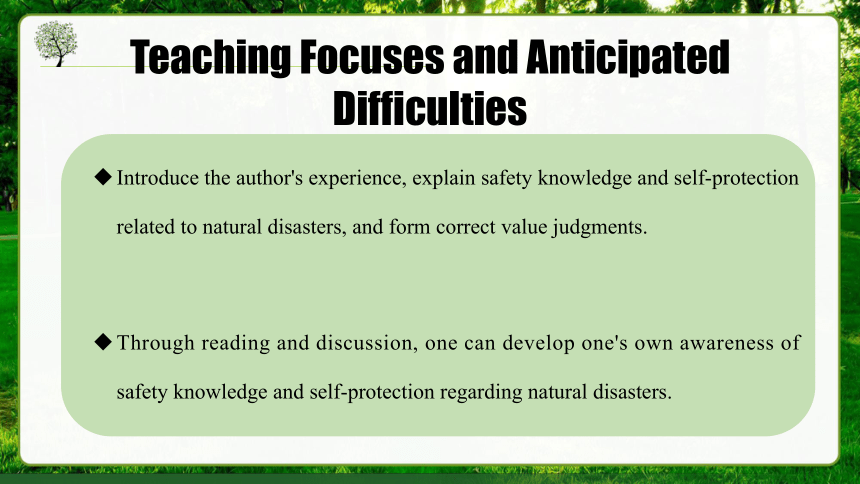

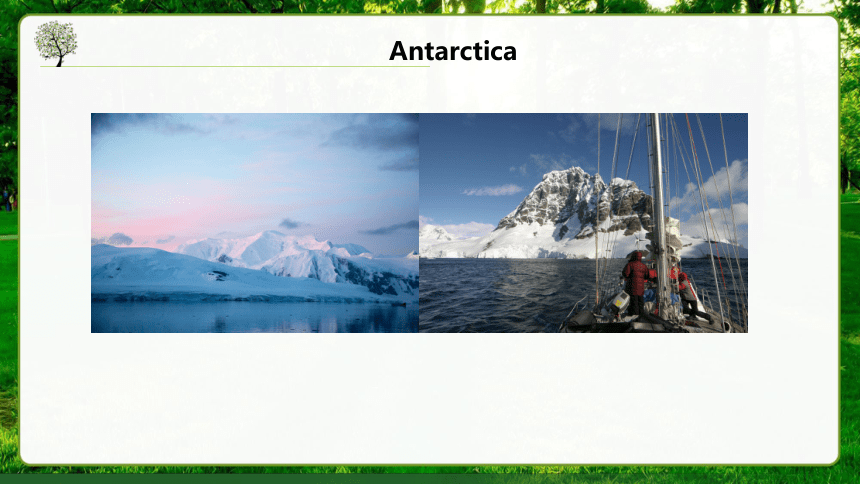
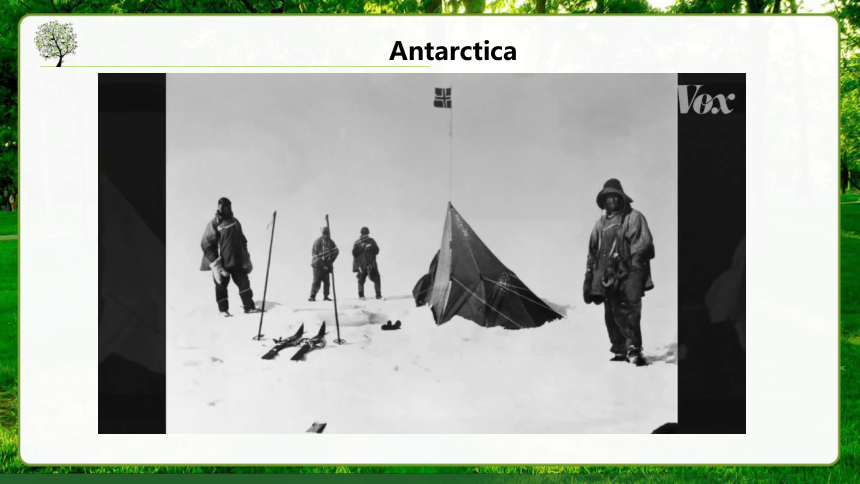
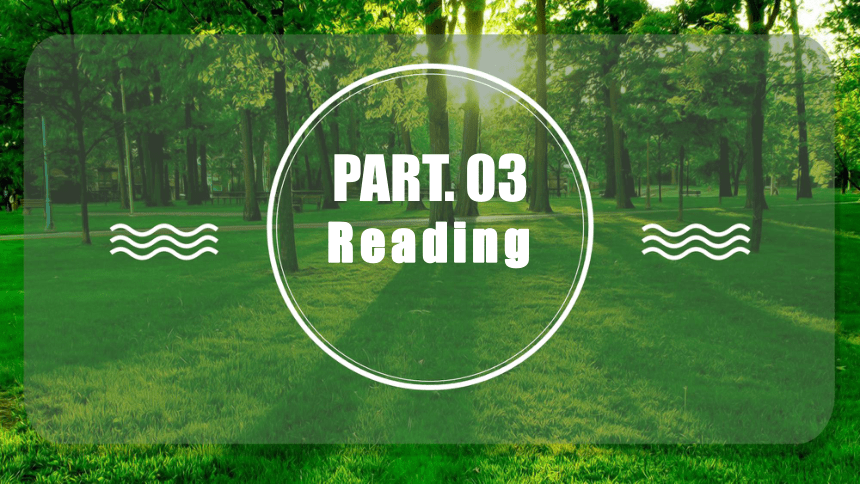
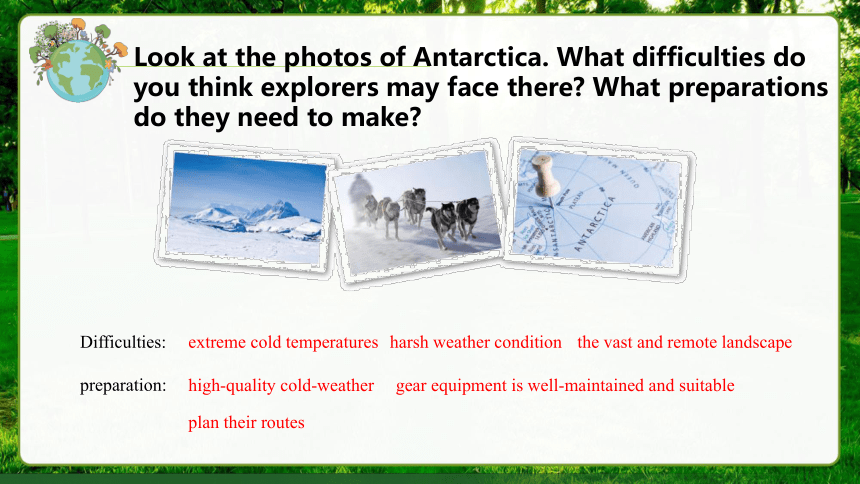
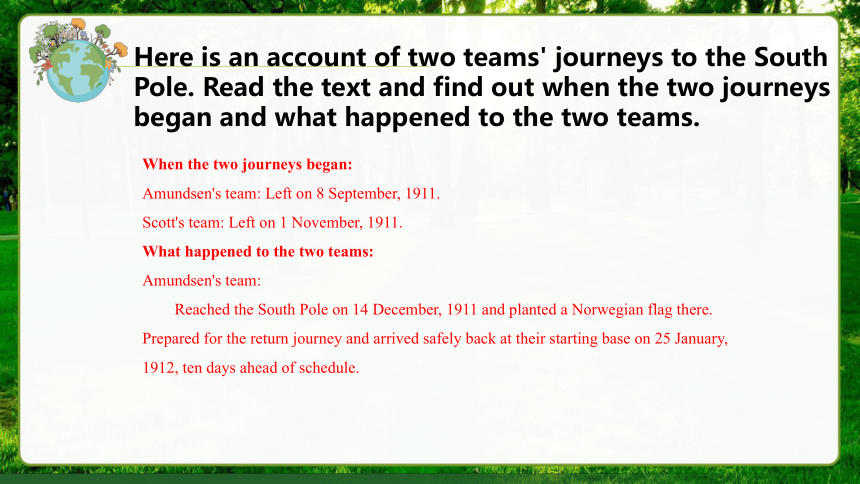
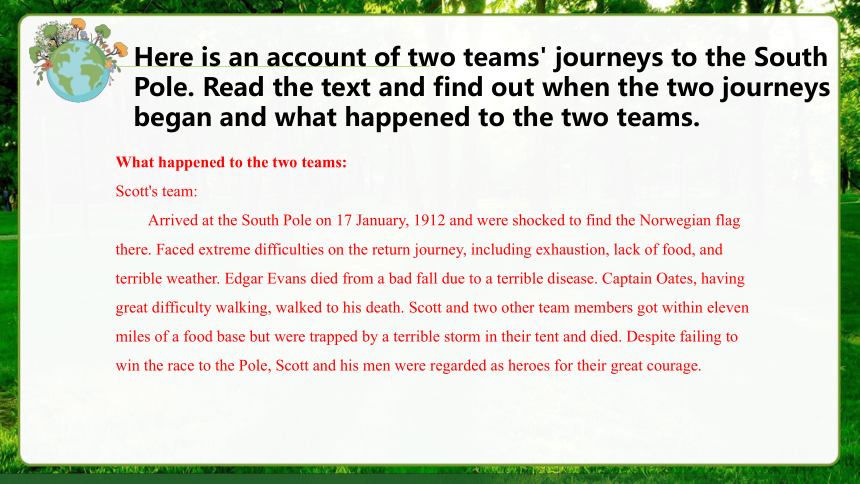
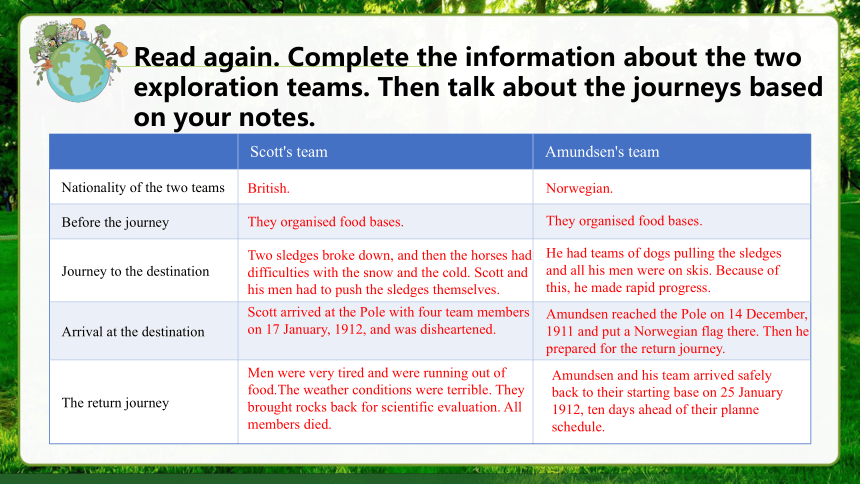
文档简介
(共35张PPT)
Humans and Nature
Unit 5
Lesson 3
PART. 01
Learning Objectives
Learning Objectives
Students can master the core vocabulary and grammar related to the theme of "Human and Nature", enhance their English application abilities in listening, speaking, reading, writing and viewing, and accurately understand and express relevant contents.
Through learning, students can understand the cultural concepts and practices of different countries and regions in terms of human and nature, enhance cultural confidence, and establish correct values and the sense of a community with a shared future for mankind.
In the process of English learning, students can use thinking methods such as analysis, comparison, induction, reasoning, criticism and innovation to improve the logicality, criticalness and innovativeness of their thinking.
Students can actively apply and adjust English learning strategies, broaden learning channels, improve learning efficiency, and lay a foundation for lifelong learning.
Teaching Focuses and Anticipated Difficulties
Introduce the author's experience, explain safety knowledge and self-protection related to natural disasters, and form correct value judgments.
Through reading and discussion, one can develop one's own awareness of safety knowledge and self-protection regarding natural disasters.
PART. 02
Lead-in
Antarctica
Antarctica
PART. 03
Reading
Look at the photos of Antarctica. What difficulties do you think explorers may face there What preparations do they need to make
extreme cold temperatures
harsh weather condition
Difficulties:
preparation:
the vast and remote landscape
high-quality cold-weather
gear equipment is well-maintained and suitable
plan their routes
Here is an account of two teams' journeys to the South Pole. Read the text and find out when the two journeys began and what happened to the two teams.
When the two journeys began:
Amundsen's team: Left on 8 September, 1911.
Scott's team: Left on 1 November, 1911.
What happened to the two teams:
Amundsen's team:
Reached the South Pole on 14 December, 1911 and planted a Norwegian flag there. Prepared for the return journey and arrived safely back at their starting base on 25 January, 1912, ten days ahead of schedule.
Here is an account of two teams' journeys to the South Pole. Read the text and find out when the two journeys began and what happened to the two teams.
What happened to the two teams:
Scott's team:
Arrived at the South Pole on 17 January, 1912 and were shocked to find the Norwegian flag there. Faced extreme difficulties on the return journey, including exhaustion, lack of food, and terrible weather. Edgar Evans died from a bad fall due to a terrible disease. Captain Oates, having great difficulty walking, walked to his death. Scott and two other team members got within eleven miles of a food base but were trapped by a terrible storm in their tent and died. Despite failing to win the race to the Pole, Scott and his men were regarded as heroes for their great courage.
Read again. Complete the information about the two exploration teams. Then talk about the journeys based on your notes.
Scott's team Amundsen's team
Nationality of the two teams
Before the journey
Journey to the destination
Arrival at the destination
The return journey
British.
They organised food bases.
Two sledges broke down, and then the horses had difficulties with the snow and the cold. Scott and his men had to push the sledges themselves.
Scott arrived at the Pole with four team members on 17 January, 1912, and was disheartened.
Men were very tired and were running out of food.The weather conditions were terrible. They brought rocks back for scientific evaluation. All members died.
Norwegian.
They organised food bases.
He had teams of dogs pulling the sledges and all his men were on skis. Because of this, he made rapid progress.
Amundsen reached the Pole on 14 December, 1911 and put a Norwegian flag there. Then he prepared for the return journey.
Amundsen and his team arrived safely
back to their starting base on 25 January
1912, ten days ahead of their planne
schedule.
Pair Work. Summarise the change of feelings on Scott's team's return journey. Give reasons for the words or phrases you have chosen.
hopeless and helpless (The men were tired and were running out of food.)
determined and devoted (They found time to look for rocks and carried twenty kilos of rocks
all the way with them.)
sad but courageous (Edgar Evans had a terrible disease and died. The next to go was Captain Oates. We all hope to meet the end with a similar spirit.)
Read the underlined sentences from Scott's diary and letter. Work out the implied meaning of these sentences from the context. Write your inferences below.
line 21
line 26
line 33
line 42
Skill Builder
Making Inferences
Sometimes things are not stated explicitly in the text. To understand what is meant, you need to read between the lines. This is called "making inferences".
Read the sentence / paragraph carefully.
Read the lines before and after it.
Use your logic and knowledge to understand the implied meaning of the text.
They lost the reason for the journey.
The men were getting weaker.
He is going to walk into the cold and die away
from the team.
The journey cost the men their lives.
Group Work. Think and share.
1. Would you say that Scott and his team were losers Why or why not
Even though Scott and his team lost the race to the Pole, they showed true determination and strength of character which are seen in heroes. Scott and his team are inspirational and not losers. Scott's team had always kept their goals in mind. They carried the rocks even in extremely difficult situations. The spirit and what they have done helped followers do further research.
Group Work. Think and share.
2. How do you understand Amundsen's saying about Scott's death "Captain Scott left a record, for honesty, for sincerity, for bravery, for everything that makes a man"
Captain Scott wrote a diary detailing his journey, each entry was truthful and honest. He was honest about the feelings of his team and his fears. Captain Scott and his team brought back rocks for research. They thought about not only themselves but also the greater good of humankind and the effect of the research.
Complete the Word Builder. Then use the correct form of the words in the Word Builder to complete the sentences below.
Suffixes
prepare preparation
situate
hope
cheer
explore
anxious
sad
-tion
-less
-ful
-ness
-ly
1. Scott and Amundsen waited anxiously for spring during the Antarctic winter of 1911.
2. Amundsen got to the South Pole before Scott because he had done more ___________ before leaving for the Pole.
3. Scott and his team got into a difficult ___________ because their sledges broke down.
situation
hopeless (ness)
cheerful
exploration
anxiously
sadness
preparation
situation
Complete the Word Builder. Then use the correct form of the words in the Word Builder to complete the sentences below.
Suffixes
prepare preparation
situate
hope
cheer
explore
anxious
sad
-tion
-less
-ful
-ness
-ly
4. Scott's team tried to stay ___________ despite all the difficulties they faced.
5. Scott experienced a great sense of ___________ after realising that all of his efforts to reach the South Pole were for nothing.
6. Scott wrote about their ___________ situation in his diary.
7. The bad weather increases the danger of their ___________.
cheerful
sadness
hopeless
exploration
Pair Work. Read the sentences from Scott's diary and letter again.
1. Discuss what he was trying to say in each one.
Well, we have turned our back now on the goal of our ambition and must face our 800 miles of solid dragging — and good-bye to most of the daydreams.
...we are unendingly cheerful, but what each man feels in his heart I can only guess. Pulling on foot gear in the morning is getting slower and slower...
Scott is expressing disappointment and a sense of loss. They had to leave the South Pole after realizing they lost the race, and now they have to face the long and difficult journey back. He is saying goodbye to their dreams of being the first to reach the Pole.
Scott is trying to show that despite their cheerful appearance, the team is physically and mentally exhausted. The fact that putting on their gear is getting slower indicates their declining strength and the difficulty they are facing.
Pair Work. Read the sentences from Scott's diary and letter again.
1. Discuss what he was trying to say in each one.
I am just going outside and may be some time.'... We knew that poor Oates was walking to his death, but though we tried to dissuade him, we knew it was the act of a brave man and an English gentleman.
... we are getting weaker, of course, and the end cannot be far. It seems a pity, but I do not think I can write more.
Scott is honoring Captain Oates' bravery. Oates knew he was going to die but chose to walk out into the cold to spare his teammates. Scott is acknowledging Oates' sacrifice and courage.
Scott is coming to terms with their inevitable death. He is weak and knows the end is near. He feels a sense of regret but is too exhausted to write more.
Pair Work. Read the sentences from Scott's diary and letter again.
2. Highlight the parts that impress you most and explain why.
lines 20-21: Finding Amundsen's team had arrived early, Scott's team felt defeated and despaired.
lines 25-26: Each one wanted to encourage the others, but no one was really sure about what's going to happen. They were getting weak.
lines 33-36: Although they were facing extreme difficulties, no one wanted to show the
weakness. All the team members wanted to act like a gentleman and die bravely.
lines 41-42: Scott fully understood that they could not pull through and they came to their final
time. He thought the exploration was worthwhile, but it just cost too much.
lines 44-45: These were Scott's last words.
Pair Work. Discuss the following questions. Read the text again if necessary.
1. Why do you think the writer of the text used the word "race" in the title
2. Why was the world shocked by Scott's death
It's a race between Scott's team and Amundsen's team to see who can get to the Pole first
For Scott's team, it's a race between survival and death.
For Scott's team, it's also a race between the terrible condition the team face and their perseverance and bravery.
Scott and his team members died so bravely.
They didn't give away the stones even in such bad conditions.
They got within just 11 miles of one of their food bases.
They died in the way of a gentleman.
Search online for the main events in China's Antarctica exploration. Why do people try to explore the toughest part of the Earth
In 1980, Australia's Antarctic Casey Station.
On November 20, 1984, China's first Antarctic expedition team landed on Fildes Peninsula and raised the Five-Starred Red Flag.
In February 1989, Zhongshan Station, China's first research station within the Antarctic Circle, was established in East Antarctica's Larsemann Hills.
China's first inland Antarctic research station, officially opened on February 2, 2009.
Taishan Station broke ground in December 2013 and was completed and opened on February 8, 2014.
On February 7, 2024, Qinling Station on Inexpressible Island in the Ross Sea was put into use.
Scientific research value
Resource exploration
Technological innovation promotion
Human curiosity and the spirit of exploration
explore v.探索、勘察
exploration n.探索、勘探
exploratory adj.探索性的、探究的
例题:
The ___________ spent years in the jungle, mapping uncharted territories.
Vocabulary
1. explorer
explorer
Vocabulary
2. preparation
prepare v.准备
prepared adj.准备好的
preparatory adj.预备的、筹备的
例题:
Good ___________ is the key to success in any exam.
preparation
make preparations for 为…… 做准备
in preparation for 作为…… 的准备
preparation for exams 备考
Vocabulary
3. ambition
ambitious adj.有雄心的、野心勃勃的
例题:
Her ___________ is to become a world-famous pianist.
ambition
have ambition to do sth 有做某事的抱负
achieve one's ambition 实现某人的抱负
political ambition 政治野心
Vocabulary
4. distant
distance n.距离
distantly adv.遥远地、疏远地
例题:
The stars are so ___________ that we can't see them with the naked eye.
distant
in the distant past 在遥远的过去
distant relative 远亲
distant future 遥远的未来
PART. 04
Exercise
Exercise: Word spelling.
1. The team set up a research b_________ in the remote area to support their scientific experiments.
2. She waited a_________ for the results of her medical test, her mind filled with various worries.
3. My grandfather often tells me a t______ about his adventures when he was young.
4. We should always uphold the values of h_________ and sincerity in our interactions with others.
5. The e____________ of the ancient city has revealed many secrets about the civilization that once thrived there.
ase
nxiously
ale
onesty
xploration
Exercise: Fill in the blanks with the appropriate forms of the given words.
1. The old explorer ______________(recount) his thrilling adventures in the Antarctic to the children when we walked into the room.
2. By the time the research team arrived at the base, the supplies they ______________(prepare) for the winter had already run out.
3. The brave soldier ______________(sacrifice) his life to save the villagers from the flood, and his story has been remembered ever since.
4. If we ______________(not take) the wrong path in the desert, we would have reached the water source before sunset.
was recounting
had prepared
sacrificed
had not taken
PART. 05
Summary
添加标题
ADD THE TITLE HERE
Lesson 3
Vocabulary
The article takes the development of the story plot as the main thread. It aims to help readers obtain the author's main information about recounting experiences.
Cultivate safety awareness, and learn safety precautions.
Reading
explorer, preparation, ambition, distant
PART. 06
Homework
Homework
Write a diary about one of your dangerous encounters.
See you next class!
Humans and Nature
Unit 5
Lesson 3
PART. 01
Learning Objectives
Learning Objectives
Students can master the core vocabulary and grammar related to the theme of "Human and Nature", enhance their English application abilities in listening, speaking, reading, writing and viewing, and accurately understand and express relevant contents.
Through learning, students can understand the cultural concepts and practices of different countries and regions in terms of human and nature, enhance cultural confidence, and establish correct values and the sense of a community with a shared future for mankind.
In the process of English learning, students can use thinking methods such as analysis, comparison, induction, reasoning, criticism and innovation to improve the logicality, criticalness and innovativeness of their thinking.
Students can actively apply and adjust English learning strategies, broaden learning channels, improve learning efficiency, and lay a foundation for lifelong learning.
Teaching Focuses and Anticipated Difficulties
Introduce the author's experience, explain safety knowledge and self-protection related to natural disasters, and form correct value judgments.
Through reading and discussion, one can develop one's own awareness of safety knowledge and self-protection regarding natural disasters.
PART. 02
Lead-in
Antarctica
Antarctica
PART. 03
Reading
Look at the photos of Antarctica. What difficulties do you think explorers may face there What preparations do they need to make
extreme cold temperatures
harsh weather condition
Difficulties:
preparation:
the vast and remote landscape
high-quality cold-weather
gear equipment is well-maintained and suitable
plan their routes
Here is an account of two teams' journeys to the South Pole. Read the text and find out when the two journeys began and what happened to the two teams.
When the two journeys began:
Amundsen's team: Left on 8 September, 1911.
Scott's team: Left on 1 November, 1911.
What happened to the two teams:
Amundsen's team:
Reached the South Pole on 14 December, 1911 and planted a Norwegian flag there. Prepared for the return journey and arrived safely back at their starting base on 25 January, 1912, ten days ahead of schedule.
Here is an account of two teams' journeys to the South Pole. Read the text and find out when the two journeys began and what happened to the two teams.
What happened to the two teams:
Scott's team:
Arrived at the South Pole on 17 January, 1912 and were shocked to find the Norwegian flag there. Faced extreme difficulties on the return journey, including exhaustion, lack of food, and terrible weather. Edgar Evans died from a bad fall due to a terrible disease. Captain Oates, having great difficulty walking, walked to his death. Scott and two other team members got within eleven miles of a food base but were trapped by a terrible storm in their tent and died. Despite failing to win the race to the Pole, Scott and his men were regarded as heroes for their great courage.
Read again. Complete the information about the two exploration teams. Then talk about the journeys based on your notes.
Scott's team Amundsen's team
Nationality of the two teams
Before the journey
Journey to the destination
Arrival at the destination
The return journey
British.
They organised food bases.
Two sledges broke down, and then the horses had difficulties with the snow and the cold. Scott and his men had to push the sledges themselves.
Scott arrived at the Pole with four team members on 17 January, 1912, and was disheartened.
Men were very tired and were running out of food.The weather conditions were terrible. They brought rocks back for scientific evaluation. All members died.
Norwegian.
They organised food bases.
He had teams of dogs pulling the sledges and all his men were on skis. Because of this, he made rapid progress.
Amundsen reached the Pole on 14 December, 1911 and put a Norwegian flag there. Then he prepared for the return journey.
Amundsen and his team arrived safely
back to their starting base on 25 January
1912, ten days ahead of their planne
schedule.
Pair Work. Summarise the change of feelings on Scott's team's return journey. Give reasons for the words or phrases you have chosen.
hopeless and helpless (The men were tired and were running out of food.)
determined and devoted (They found time to look for rocks and carried twenty kilos of rocks
all the way with them.)
sad but courageous (Edgar Evans had a terrible disease and died. The next to go was Captain Oates. We all hope to meet the end with a similar spirit.)
Read the underlined sentences from Scott's diary and letter. Work out the implied meaning of these sentences from the context. Write your inferences below.
line 21
line 26
line 33
line 42
Skill Builder
Making Inferences
Sometimes things are not stated explicitly in the text. To understand what is meant, you need to read between the lines. This is called "making inferences".
Read the sentence / paragraph carefully.
Read the lines before and after it.
Use your logic and knowledge to understand the implied meaning of the text.
They lost the reason for the journey.
The men were getting weaker.
He is going to walk into the cold and die away
from the team.
The journey cost the men their lives.
Group Work. Think and share.
1. Would you say that Scott and his team were losers Why or why not
Even though Scott and his team lost the race to the Pole, they showed true determination and strength of character which are seen in heroes. Scott and his team are inspirational and not losers. Scott's team had always kept their goals in mind. They carried the rocks even in extremely difficult situations. The spirit and what they have done helped followers do further research.
Group Work. Think and share.
2. How do you understand Amundsen's saying about Scott's death "Captain Scott left a record, for honesty, for sincerity, for bravery, for everything that makes a man"
Captain Scott wrote a diary detailing his journey, each entry was truthful and honest. He was honest about the feelings of his team and his fears. Captain Scott and his team brought back rocks for research. They thought about not only themselves but also the greater good of humankind and the effect of the research.
Complete the Word Builder. Then use the correct form of the words in the Word Builder to complete the sentences below.
Suffixes
prepare preparation
situate
hope
cheer
explore
anxious
sad
-tion
-less
-ful
-ness
-ly
1. Scott and Amundsen waited anxiously for spring during the Antarctic winter of 1911.
2. Amundsen got to the South Pole before Scott because he had done more ___________ before leaving for the Pole.
3. Scott and his team got into a difficult ___________ because their sledges broke down.
situation
hopeless (ness)
cheerful
exploration
anxiously
sadness
preparation
situation
Complete the Word Builder. Then use the correct form of the words in the Word Builder to complete the sentences below.
Suffixes
prepare preparation
situate
hope
cheer
explore
anxious
sad
-tion
-less
-ful
-ness
-ly
4. Scott's team tried to stay ___________ despite all the difficulties they faced.
5. Scott experienced a great sense of ___________ after realising that all of his efforts to reach the South Pole were for nothing.
6. Scott wrote about their ___________ situation in his diary.
7. The bad weather increases the danger of their ___________.
cheerful
sadness
hopeless
exploration
Pair Work. Read the sentences from Scott's diary and letter again.
1. Discuss what he was trying to say in each one.
Well, we have turned our back now on the goal of our ambition and must face our 800 miles of solid dragging — and good-bye to most of the daydreams.
...we are unendingly cheerful, but what each man feels in his heart I can only guess. Pulling on foot gear in the morning is getting slower and slower...
Scott is expressing disappointment and a sense of loss. They had to leave the South Pole after realizing they lost the race, and now they have to face the long and difficult journey back. He is saying goodbye to their dreams of being the first to reach the Pole.
Scott is trying to show that despite their cheerful appearance, the team is physically and mentally exhausted. The fact that putting on their gear is getting slower indicates their declining strength and the difficulty they are facing.
Pair Work. Read the sentences from Scott's diary and letter again.
1. Discuss what he was trying to say in each one.
I am just going outside and may be some time.'... We knew that poor Oates was walking to his death, but though we tried to dissuade him, we knew it was the act of a brave man and an English gentleman.
... we are getting weaker, of course, and the end cannot be far. It seems a pity, but I do not think I can write more.
Scott is honoring Captain Oates' bravery. Oates knew he was going to die but chose to walk out into the cold to spare his teammates. Scott is acknowledging Oates' sacrifice and courage.
Scott is coming to terms with their inevitable death. He is weak and knows the end is near. He feels a sense of regret but is too exhausted to write more.
Pair Work. Read the sentences from Scott's diary and letter again.
2. Highlight the parts that impress you most and explain why.
lines 20-21: Finding Amundsen's team had arrived early, Scott's team felt defeated and despaired.
lines 25-26: Each one wanted to encourage the others, but no one was really sure about what's going to happen. They were getting weak.
lines 33-36: Although they were facing extreme difficulties, no one wanted to show the
weakness. All the team members wanted to act like a gentleman and die bravely.
lines 41-42: Scott fully understood that they could not pull through and they came to their final
time. He thought the exploration was worthwhile, but it just cost too much.
lines 44-45: These were Scott's last words.
Pair Work. Discuss the following questions. Read the text again if necessary.
1. Why do you think the writer of the text used the word "race" in the title
2. Why was the world shocked by Scott's death
It's a race between Scott's team and Amundsen's team to see who can get to the Pole first
For Scott's team, it's a race between survival and death.
For Scott's team, it's also a race between the terrible condition the team face and their perseverance and bravery.
Scott and his team members died so bravely.
They didn't give away the stones even in such bad conditions.
They got within just 11 miles of one of their food bases.
They died in the way of a gentleman.
Search online for the main events in China's Antarctica exploration. Why do people try to explore the toughest part of the Earth
In 1980, Australia's Antarctic Casey Station.
On November 20, 1984, China's first Antarctic expedition team landed on Fildes Peninsula and raised the Five-Starred Red Flag.
In February 1989, Zhongshan Station, China's first research station within the Antarctic Circle, was established in East Antarctica's Larsemann Hills.
China's first inland Antarctic research station, officially opened on February 2, 2009.
Taishan Station broke ground in December 2013 and was completed and opened on February 8, 2014.
On February 7, 2024, Qinling Station on Inexpressible Island in the Ross Sea was put into use.
Scientific research value
Resource exploration
Technological innovation promotion
Human curiosity and the spirit of exploration
explore v.探索、勘察
exploration n.探索、勘探
exploratory adj.探索性的、探究的
例题:
The ___________ spent years in the jungle, mapping uncharted territories.
Vocabulary
1. explorer
explorer
Vocabulary
2. preparation
prepare v.准备
prepared adj.准备好的
preparatory adj.预备的、筹备的
例题:
Good ___________ is the key to success in any exam.
preparation
make preparations for 为…… 做准备
in preparation for 作为…… 的准备
preparation for exams 备考
Vocabulary
3. ambition
ambitious adj.有雄心的、野心勃勃的
例题:
Her ___________ is to become a world-famous pianist.
ambition
have ambition to do sth 有做某事的抱负
achieve one's ambition 实现某人的抱负
political ambition 政治野心
Vocabulary
4. distant
distance n.距离
distantly adv.遥远地、疏远地
例题:
The stars are so ___________ that we can't see them with the naked eye.
distant
in the distant past 在遥远的过去
distant relative 远亲
distant future 遥远的未来
PART. 04
Exercise
Exercise: Word spelling.
1. The team set up a research b_________ in the remote area to support their scientific experiments.
2. She waited a_________ for the results of her medical test, her mind filled with various worries.
3. My grandfather often tells me a t______ about his adventures when he was young.
4. We should always uphold the values of h_________ and sincerity in our interactions with others.
5. The e____________ of the ancient city has revealed many secrets about the civilization that once thrived there.
ase
nxiously
ale
onesty
xploration
Exercise: Fill in the blanks with the appropriate forms of the given words.
1. The old explorer ______________(recount) his thrilling adventures in the Antarctic to the children when we walked into the room.
2. By the time the research team arrived at the base, the supplies they ______________(prepare) for the winter had already run out.
3. The brave soldier ______________(sacrifice) his life to save the villagers from the flood, and his story has been remembered ever since.
4. If we ______________(not take) the wrong path in the desert, we would have reached the water source before sunset.
was recounting
had prepared
sacrificed
had not taken
PART. 05
Summary
添加标题
ADD THE TITLE HERE
Lesson 3
Vocabulary
The article takes the development of the story plot as the main thread. It aims to help readers obtain the author's main information about recounting experiences.
Cultivate safety awareness, and learn safety precautions.
Reading
explorer, preparation, ambition, distant
PART. 06
Homework
Homework
Write a diary about one of your dangerous encounters.
See you next class!
同课章节目录
- Unit 4 Information technology
- Lesson 1 Avatars
- Lesson 2 Apps
- Lesson 3 Internet and Friendships
- Unit 5 Humans and nature
- Lesson 1 A Sea Story
- Lesson 2 Professional Rescue Team
- Lesson 3 Race to the Pole
- Unit 6 The admirable
- Lesson 1 A Medical Pioneer
- Lesson 2 History Makers
- Lesson 3 The Superhero Behind Superman
